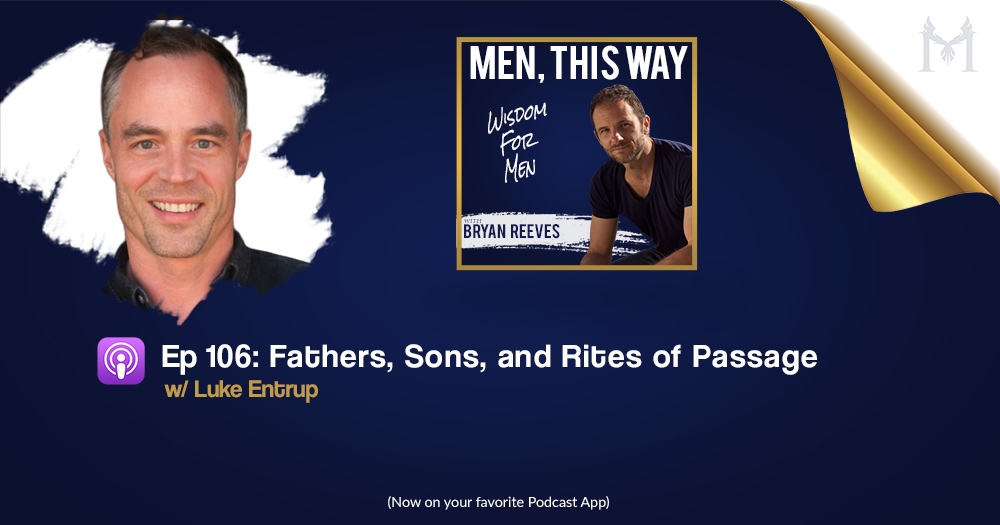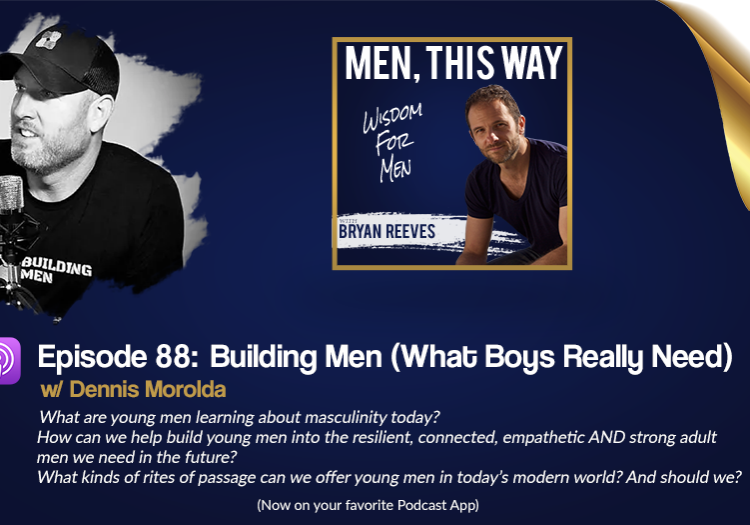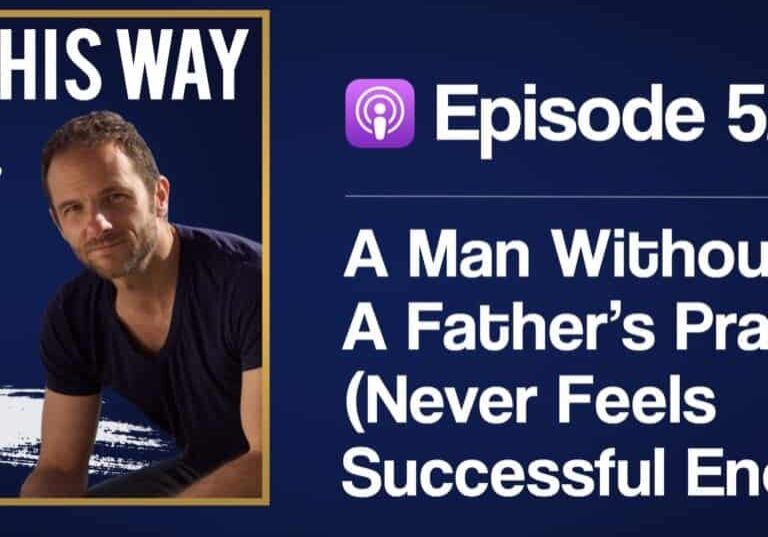Podcast: Play in new window | Download | Embed
Subscribe: Apple Podcasts | Spotify | RSS | More
In today’s episode, I engage in a profound conversation with the founder of “The Father Son Connection Experience,” Luke Entrup. We discuss various topics related to men and emotions, fathers and sons, and rites of passage for boys at different ages.
HIGHLIGHTS (brought to you by … obviously … AI!)
(00:00) Intro
(07:03) Some significant event or experience in your early life that played a fundamental role in shaping you as a man?
Bryan expresses a desire to learn more about the Lukes significant life experiences that have shaped him as a man. Luke, shares a pivotal event from his early life that profoundly influenced his journey into manhood.
Luke begins by describing his passion for acting during his upbringing and how it was central to his identity. However, as he reached his late teens, his enthusiasm for acting waned, and he felt lost and uncertain about his path in life.
At the age of 22, Luke’s father introduced him to a transformative men’s weekend experience. This event had a profound impact on Luke’s life, marking his transition from boyhood to manhood. He describes how the supportive community of men helped him confront his insecurities, self-doubt, and narrow-mindedness. Luke vividly recalls a powerful moment during the weekend when an elderly man declared him a man, sparking cheers from the group.
This experience fundamentally changed Luke’s perspective on masculinity, emphasizing the importance of living a purposeful life, valuing emotions, and combining inner strength with an open heart. It set him on a lifelong journey to seek deeper truth and meaning, redirecting the trajectory of his life.
Bryan, the host, reflects on his own experiences and the absence of a similar rite of passage with his own father, highlighting the prevalent issue of uninitiated men in today’s culture. Luke acknowledges the societal challenge of uninitiated men and the need to reintroduce meaningful rites of passage into the culture to address this issue.
The conversation touches on the cultural shift toward healthier masculinity and the potential for positive change in the future.
(16:06) What was the organization your father was part in?
Luke, shares a significant life experience from his early years that profoundly impacted his journey into manhood. The host, Bryan, also reflects on his own experiences in this context.
Luke discusses how his father’s upbringing played a crucial role in shaping him as a man, emphasizing how blessed he feels to have had such a father. He mentions an organization called the Mankind Project that his father was part of, which led him to an impactful men’s weekend experience.
The men’s weekend, known as the New Warrior Training Adventure, involved being surrounded by a community of around 80 men. Luke and Bryan share their experiences from participating in this training, highlighting the powerful moments that marked their transitions from boyhood to manhood.
Luke explains the significance of such moments, noting the deep human need for belonging and the sense of isolation that many men experience in today’s culture. He emphasizes that the belonging experienced in a brotherhood of men can be transformative and nurturing.
Bryan adds that the sense of belonging, even more than problem-solving, is what often draws men to this type of work. They both underscore the unique quality of men’s work and the vital role it plays in providing both support and challenge, ultimately contributing to personal growth and fulfillment.
The podcast episode continues to discuss the importance of men’s work and the impact it can have on personal development and self-discovery.
(25:33) what is Rights of passage and why is it so important for young men?
the topic shifts to discussing rites of passage, particularly within the context of Luke’s work with fathers and sons. Bryan initiates the conversation by asking Luke to describe what a rite of passage is and why it is essential for young men.
Luke explains that a rite of passage is a ceremonial marking of the transition from one phase of life to another, emphasizing the significant shifts in identity and being. He identifies the transition from childhood into adolescence as a crucial rite of passage, often marked by the onset of puberty and a strong desire for mastery and belonging. Luke highlights the potential challenges young men may face if they lack meaningful rites of passage during this period, leading them to seek belonging in less healthy ways.
To address this, Luke’s work focuses on strengthening the bond between fathers (or father figures) and their sons. He describes the immersive experiences they create, involving outdoor activities, ceremonies, and emotional processing. These experiences are designed to guide young men toward embracing a path of “warriorship” and self-discovery while maintaining a close connection with their fathers.
Bryan then inquires about how fathers can identify the right time to engage in such rites of passage with their sons and asks about any signs or indications that might signal the appropriate timing for this transformative experience. The discussion emphasizes the importance of fathers and sons forging deep connections during adolescence to provide support and guidance as the young men navigate the challenges of growing up.
(29:17) How can a father identify when is the right time?
The conversation in the podcast continues with Luke discussing the specific age ranges for rites of passage. He mentions that the first rite of passage he focuses on is for boys aged 10 to 14, marking the transition from childhood into puberty. During this phase, the involvement of fathers is emphasized to establish a healthy connection between the father and son.
Luke also distinguishes this age range from the passage into adulthood, which typically occurs between the ages of 17 to 20. In traditional cultures, this transition is handled by the community or tribe, with uncles or other community members taking the lead in initiating the young men into adulthood.
The discussion underscores the importance of recognizing the different needs and dynamics of these distinct rites of passage and highlights the role of fathers in fostering a strong connection with their sons during the adolescent years.
(30:58) What are some of your favourite rights of passagethat you’ve heard off through traditional culture?
the two individuals delve into the topic of rites of passage in traditional cultures. They express curiosity about notable initiation ceremonies and discuss the profound nature of these rituals. One example they highlight is the East African tradition where young boys must venture out with a spear to either kill a lion or face the possibility of not returning, emphasizing the role of ordeal in initiation.
The conversation draws parallels with Joseph Campbell’s Hero’s Journey, emphasizing separation, ordeal, and reintegration as essential components of these rites. Another rite of passage they discuss involves head-shaving upon entering a monastery, symbolizing the shedding of one’s identity and commitment to a monastic path.
They also share personal experiences, such as military basic training, where head-shaving is a part of the initiation process, but they note that it lacks the presence of an elder or mentor, a vital element often missing in modern initiation ceremonies.
The conversation touches on the absence of elder guidance in contemporary initiation rituals, leading to boys initiating boys in less structured ways. They reference the wisdom of Maldoma Somay, highlighting the importance of initiation despite its risks, and they stress the need for a cultural shift that embraces both life and death, as advocated by Stephen Jenkinson.
Overall, their discussion underscores the significance of initiation rituals and the need to reestablish the role of elders in guiding young individuals through these transformative experiences.
(36:06) What would you say to a father who sees his son’s danger signs?
the topic revolves around fathers who are beginning to notice concerning behavior in their sons, particularly during the adolescent years. The conversation acknowledges that many fathers have witnessed their sons engaging in rebellious actions, such as breaking rules, encountering legal issues, or struggling in school, typically around the ages of 14 to 15.
The individuals discuss a common response to these challenges, where some parents opt for therapeutic wilderness schools followed by boarding schools to provide structure and guidance for their sons. They highlight that this approach isn’t about passing judgment but rather addressing the need for intervention.
One participant shares his perspective on how fathers can navigate this critical period. He reflects on his experience with his own 12-year-old son and their desire to spend quality time together, particularly on backpacking trips. He emphasizes the importance of providing opportunities for children to break away from their routine, gain new perspectives, and experience wonder, awe, and aliveness. He suggests that fathers play a crucial role in broadening their children’s horizons and helping them see beyond their immediate circumstances.
Furthermore, the conversation touches on the idea that fathers can sometimes feel disconnected or powerless in their families, which can lead to seeking power and distraction elsewhere. It underscores the importance of fathers being actively engaged in their children’s lives, offering loving presence, and creating opportunities for meaningful connection, especially during the challenging adolescent years.
(40:52) What happens to father’s when they start to really check in to their child’s experience?
When Bryan asked about the changes fathers might undergo when they genuinely engage with their children’s experiences, Luke offered valuable insights. They emphasized that fathers often experience a sense of relief, feeling as though they’ve been waiting to step into a more supportive parenting role. It’s an opportunity to become the father they’ve always wanted to be.
Additionally, the conversation delved into the challenges fathers face as their sons approach the difficult adolescent years. They may be reminded of their own challenging experiences during that age, and this could bring up unpleasant memories. However, this process can also serve as an opportunity for fathers to confront their own past and how it influences their parenting.
Luke acknowledged that parenting can lead to feelings of inadequacy, even among those who genuinely care about their children’s well-being. They discussed how it’s common for fathers to be hard on themselves, even when they are committed and engaged parents.
In the context of misconceptions about fathers as parents, Luke touched on the notion that fathers are often seen primarily as providers of structure and discipline, while emotional support is viewed as the mother’s domain. They highlighted the importance of fathers embracing their role in emotional connections with their children rather than outsourcing it entirely.
(44:35) What do you think are some of the dominant common misconception about father’s?
The conversation delves into the role of fathers, particularly common misconceptions and myths that can affect their parenting. One of the misconceptions discussed is the idea that mothers are solely responsible for emotional support, while fathers focus solely on providing structural discipline. Lukes argue that while there is some truth to these roles, they caution against fathers completely outsourcing emotional connections with their children. They emphasize that neglecting emotional presence sends signals to children, especially boys, that emotions are not acceptable. The conversation highlights the challenge of dealing with messy emotional experiences and the importance of fathers being comfortable with their emotions.
Furthermore, the discussion briefly touches on the differences between father-daughter and father-son relationships. While acknowledging that there are no absolutes, Lukes express curiosity about the distinctions between these relationships. However, the conversation does not delve deeply into this topic, leaving it open for further exploration
(46:21) What do you think is different about the father- daughter relationship than the father-son relationship?
Bryan posed an intriguing question about the distinctions between father-daughter and father-son relationships. In response, Luke, who has a 12-year-old son and a nine-year-old daughter, acknowledged that while they haven’t professionally explored this area extensively, they can share insights from their personal experience.
From their perspective, they noticed a slight role reversal in their own family dynamics. In their case, their daughter seeks sweet emotional connections from her father, while looking to her mother for guidance on womanhood. Interestingly, they mentioned that there appears to be more friction in the mother-daughter relationship, which they attribute to complexities that can arise in such connections.
Luke expressed humility regarding their parenting journey, acknowledging that it remains a continuous exploration. They admitted that their observations come from being on the receiving end as a child and are open to the complexities of these relationships.
(47:55) What can father’s do, how can they ensure that they are nurturing emotional intelligence in their son’s?
When Bryan asked about the changes fathers might undergo when they genuinely engage with their children’s experiences, Luke offered valuable insights. They emphasized that fathers often experience a sense of relief, feeling as though they’ve been waiting to step into a more supportive parenting role. It’s an opportunity to become the father they’ve always wanted to be.
Additionally, the conversation delved into the challenges fathers face as their sons approach the difficult adolescent years. They may be reminded of their own challenging experiences during that age, and this could bring up unpleasant memories. However, this process can also serve as an opportunity for fathers to confront their own past and how it influences their parenting.
Luke acknowledged that parenting can lead to feelings of inadequacy, even among those who genuinely care about their children’s well-being. They discussed how it’s common for fathers to be hard on themselves, even when they are committed and engaged parents.
In the context of misconceptions about fathers as parents, Luke touched on the notion that fathers are often seen primarily as providers of structure and discipline, while emotional support is viewed as the mother’s domain. They highlighted the importance of fathers embracing their role in emotional connections with their children rather than outsourcing it entirely.
(53:13) How do you define a successful father-son relationship?
Bryan and Luke, explores the key components of a thriving father-son relationship, particularly during adolescence. Luke emphasizes the importance of free exchange of information and energy between father and son, fostering an environment where they can speak their truths, even if it’s uncomfortable. He envisions a connection where they can walk side by side through the world with ease and depth, drawing inspiration from Robert Bly’s idea of the masculine connection in the forest, where words aren’t always necessary.
Luke shares personal experiences, highlighting the significance of a father being one of the people a teenage boy turns to when facing challenges or confusion, especially during adolescence. He reflects on his own journey, having initially looked up to his father as a teenager but later grappling with feelings of betrayal and estrangement. He suggests that while some level of betrayal may be inevitable, it’s crucial to recognize and work through the resulting beliefs about oneself.
Luke offers valuable advice to men who are estranged from their fathers or struggle with their relationships. He encourages acknowledging the inevitability of betrayal and splitting off the parts of the father that provided gifts from those that were inadequate. He emphasizes the importance of doing the inner work to prevent living with anger, rage, or depression rooted in unmet fatherly expectations.
Recently, Luke has been working with a therapist named John Lee, who provided a revolutionary perspective: “Stop sunning your father.” This shift in thinking has been transformative for Luke and signifies a crucial step across a threshold in his own life, facilitated by the guidance of an elder therapist.
(01:02:58) What’s 1 insight you might share with people?
In response to Bryan’s questions, Luke shares advice for men who have never been initiated into manhood. He encourages them to seek out communities and mentors where they feel drawn to men they admire and resonate with. Luke suggests spending time with these mentors, engaging in activities with them, and learning from their example. He recommends that men explore programs and communities focused on rites of passage and healthy masculinity to facilitate their own initiation process.
Regarding resources for fathers who want to prepare for their child’s initiation into adolescence, Luke mentions his program called Elevate 2024, designed as a year-long initiatory men’s experience. He emphasizes the importance of fathers connecting with their children through nature, whether it’s camping trips or outdoor adventures, where they can bond, create lasting memories, and have meaningful conversations that may not occur in everyday life. Luke also mentions his website, FatherSonConnection.com, for those interested in guided experiences for 10 to 14-year-old boys and their dads.
(01:08:06) 5 Core Emotional Triggers.
Bryan initiates a lightning round of questions, asking Luke about his core emotional triggers
CONNECT WITH LUKE ENTRUP
Website – www.fathersonconnection.com
Official Website – www.lukeentrup.com
Instagram – @lukeentrup
Podcast – CRAZY WISDOM
CONNECT WITH BRYAN
Instagram – @bryanreevesinsight
Youtube – @bryanreevesofficial
Facebook – @Bryanreevesofficial
Tiktok – @bryanreevesinsight
- 0share
- 0Facebook
- 0Twitter
- 0Pinterest
- 0Email




